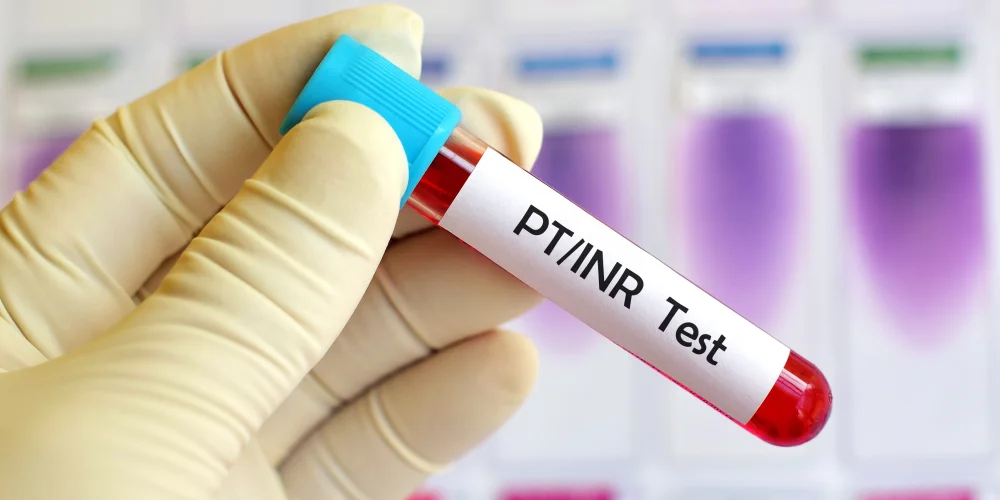PT/INR Test
Assessment for Blood Clotting Function
It is vital in determining the duration of blood clotting and focuses on the extrinsic pathways of blood coagulation. It determines the time the plasma takes to form clots once certain factors that promote clotting are activated. This test plays an important part for diagnosing blood disorders. It is also useful in keeping track of patients taking anticoagulants, like warfarin, and assessing the possibility of bleeding excessively or the clotting. By assessing PT (prothrombin duration) and calculating the INR (International Normalized Ratio), medical professionals can adjust dosages to ensure levels of therapeutic effectiveness and decrease the chance of developing complications. This test can be crucial in a variety of clinical settings, as it allows for prompt intervention and individualized treatments for patients who are at risk for thrombosis or hemorrhage.

When is the PT/INR Test Prescribed?
The PT/INR Test is used in a variety of clinical situations:
- Monitoring Anticoagulant Therapy : It is essential for those who take warfarin and any vitamin K antagonists, to be sure that the blood clotting is within the therapeutic range.
- Diagnosis of Bleeding Disorders : It is used to identify conditions like hemophilia and liver diseases, which can affect the production of clotting factor.
- Evaluation of Liver Function : Liver disease can hinder blood clotting factor production that can result in abnormal PT/INR results.
Preparation for the PT/INR Test
The PT (Prothrombin Time) or INR (International Normalized Ratio) Test typically requires no special preparation from the patient. It’s generally recommended to maintain a normal diet and hydration before the test. However, it is crucial to inform healthcare providers about any medications being taken, particularly anticoagulants like warfarin, as these can significantly impact test results. Anticoagulants affect the blood’s ability to clot, directly influencing PT/INR values. By disclosing this information, healthcare professionals can accurately interpret the test results and adjust treatment plans accordingly, ensuring effective management of clotting disorders and maintaining optimal health outcomes for patients.
Parameters Considered During PT/INR Test
The PT INR Test is vital to determine the ability of blood clotting. It determines Prothrombin Time (PT), which is a measure of how long it takes to make clots in blood, in addition to the International Normalized Ratio (INR) which is a standard measure used to assess the effect of anticoagulants such as warfarin. PT tests for INR help healthcare professionals to control anticoagulant therapy efficiently by ensuring that the clotting level is within acceptable limits to avoid bleeding too much and the formation of clots. This test is vital for those taking anticoagulant medication as well as those who are susceptible to bleeding problems or even thrombosis.
Time Required for PT/INR Test Report
The PT/INR Test is a rapid procedure, and results usually being available within hours. The speed of turnaround lets healthcare professionals adjust anticoagulant therapy when needed.
PT/INR Test Price
In Chirayu Super Speciality Hospital, the PT/INR Test price Rs.400, which is affordable and accessibility to patients in need of blood coagulation monitoring.
Book an Appointment for PT/INR Test
Making an appointment for your PT/INR Test at Chirayu Super Speciality Hospital in Bhayandar is simple. Our pathology lab in Bhayandar offers convenient booking through the hospital’s website or by contacting our customer service team for assistance.
What Our Patients Say
Hear from our valued patients about their experiences at Chirayu Super Speciality Hospital and how our care has made a positive impact on their health and well-being.


Excellent healthcare professionals providing thorough coagulation monitoring.


Peace of mind knowing my PT / INR levels are well-monitored.


Affordable pricing and comprehensive PT / INR testing.


Accessible and reliable coagulation monitoring at Chirayu Super Speciality Hospital.


Clear explanations and rapid results for my clotting evaluation.


Accurate PT / INR monitoring helped manage my warfarin therapy effectively.
Frequently Asked Questions
Here, we provide answers to some of the most commonly asked questions to help you better understand our services, policies, and facilities. If you have any additional questions, please do not hesitate to contact us.
The target INR range for patients on warfarin therapy varies depending on their condition but is typically between 2.0 and 3.0.
Frequency of testing depends on individual patient needs, but initially, it may be done weekly or bi-weekly until stable, then less frequently thereafter.
Yes, the PT / INR Test can help diagnose various clotting disorders, including those related to liver disease or genetic clotting factor deficiencies.
Medications, dietary changes, liver function, and underlying health conditions can all influence PT / INR results.
Yes, the PT / INR Test is a safe and standard diagnostic procedure used worldwide to monitor blood clotting ability and adjust anticoagulant therapy.